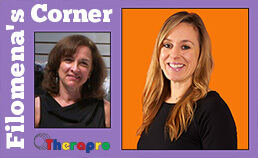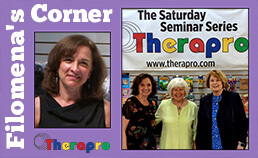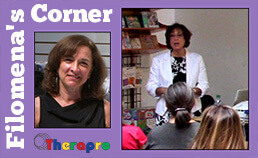
October’s Saturday Seminar speaker, Lisa Mitchell, M.S., CCC-SLP is an expert in Childhood Apraxia of Speech (CAS). She is a pediatric speech language pathologist, Clinical Director and co-owner of Clearly Speaking, a private practice in Hampton Falls, Dover and Londonderry, NH. Lisa has been recognized for extensive training and expertise in CAS by Apraxia-Kids.
On October 26th, Lisa shared her passion with attendees who are speech language pathologists, occupational therapists, OT students, and teachers, with her presentation entitled Armed and Ready for Monday Morning! 26+ Valuable Clinical Tools for Treating CAS (Childhood Apraxia of Speech) from A-Z. She organized her talk in a unique way that highlighted “Tips and Strategies for Treating CAS” in an A through Z format. She discussed some of her favorite publications including those by Pam Marshalla, such as Successful R Therapy, and Apraxia Uncovered.
Lisa
explained that CAS is typically part of a broader diagnosis and is a
challenging diagnosis to treat. She discussed the importance of
collaboration with others on the team, i.e. OTs, who are working with
the student on motor issues. Difficulty with motor planning can lead to
errors in speech production. With a motor speech disorder, the student
has difficulty achieving smooth movement from one sound to another. So,
as the complexity and length of words increase, the student has more
difficulty. As we can imagine, the child’s level of frustration
increases when they are trying to talk.
Wind-Up
Toys for reinforcers. Lisa touched on a controversial area for
speech/language pathologists’ treatment – oral motor exercises. She
discussed how using exercises not attached to speech for children with
CAS, such as blowing whistles, bubbles, etc. will not help a child talk.
However, using a whistle to help position the lips for speech is useful
if the whistle is removed and the student is then given a syllable to
produce using lip rounding.
Lisa is a gifted presenter and her passion for her CAS work is evident! She offered a hefty toolbox of ideas and strategies for treating CAS. With such a varied audience today, her tip that was very powerful and resonated with us all was that team collaboration, including parents, strongly benefits a child with Childhood Apraxia of Speech.
Here are some of the appreciative comments from those who attended Lisa’s seminar:
“Very insightful and great ideas for therapy. Enjoyed the insights on co-treating.” – Beth M., COTA/L
“I would recommend this seminar to a colleague. I would like to learn more about collaboration of OT/PT/SLP – how to work together.” – Maria L., Speech/Language Pathologist
“Easily explained and well thought out.” – Tai M., Occupational Therapy Grad student
“Learned a lot and was easy to understand.” – Anonymous, Occupational Therapy Grad student
Thank you, Lisa!
Filomena Connor, OT, MS, OTR
October 26, 2019


